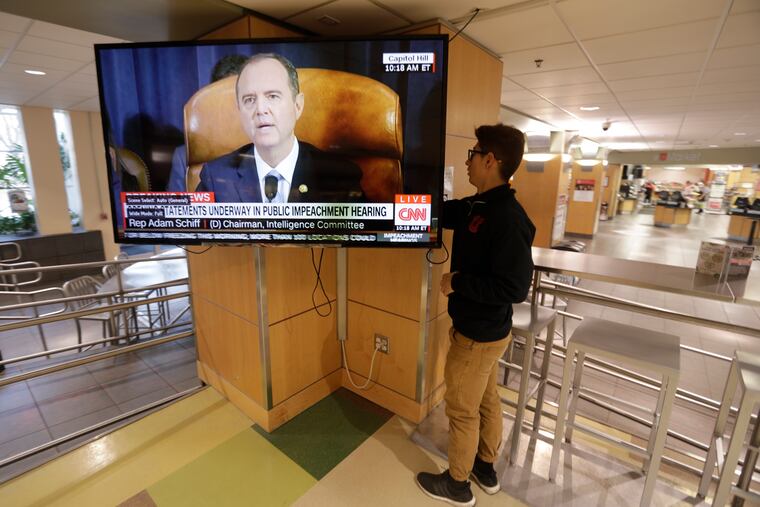TV is doing more political coverage than ever, but is it having any effect? | Opinion
There has never been more overall political coverage in any one year than in 2019.

This column should have been a love song to network and cable news.
Back in the late 1990′s, when the networks cut back on prime-time coverage of the Democratic and Republican National Conventions and aired reruns of entertainment programs instead, I denounced them.
“Too boring, too costly, the world’s changed, let the cable channels cover the conventions,” network executives said when I interviewed them.
“You are abrogating your responsibility to broadcast in the public interest, a pledge you made to the Federal Communications Commission to get the licenses for those stations that make millions for you,” I replied.
So, as this year of the TV hearing comes to a close, I should be singing their praises.
There has never been more overall political coverage in any one year than in 2019. There has been wall-to-wall live cable and sometimes even network coverage that preempts talk shows and soap operas starting as early at 9 a.m. on some days. On cable, the hosts and panels covering it were regularly on air by 6 a.m. advancing the upcoming hearing. Many hearings ran through the afternoons, with some extending into the night, preempting everything else on the schedule though prime time.
And then, late night shows — which once upon a time (for those old enough to remember Johnny Carson) mainly steered clear of politics — have been filled with political guests, the more controversial the better.
Democratic Rep. Adam Schiff, chair of the House Intelligence Committee, was featured on both the “Late Show with Stephen Colbert” and “Late Night with Seth Myers,” on CBS and NBC, respectively, last week and Monday night. The impeachment hearings have been at the center of this development. But they are not solely responsible.
Last week, for example, as the impeachment process moved off camera with the House Judiciary Committee writing up its articles of impeachment, TV turned its cameras to a Senate hearing featuring the Justice Department’s Inspector General Michael Horowitz looking into the origins of the FBI probe of Russian interference in the 2016 presidential election.
And I will never forget the House Oversight Committee’s televised session back in February with Michael Cohen, former attorney of President Donald Trump. That was the hearing that, after hours of testimony from Mr. Cohen describing sleazy payoffs and Mafia-like threats, concluded with Rep. Elijah Cummings, then chairman of the House Oversight Committee, delivering a passionate and poetic exhortation to Cohen and all Americans to be better and more moral citizens.
There will be even more political TV to come in 2020 with the conventions, campaigns and likelihood of an impeachment trial.
But the question that demands not just being asked but also honestly discussed is whether all that television coverage has made any real-world difference. And if not, what does that say about the belief I have long held in the power of TV, which remains the principal storyteller in American life, to change the world with its cameras?
I don’t think the coverage has made much if any difference — a claim reflected in the majority of polls. But the problem is not solely with TV; the fault is also with us and what we demand in our viewing. We want and have the on-demand means to watch only what we find pleasantly entertaining or amusing.
TV is partially responsible for this mindset thanks to 75 years of presenting virtually all content, even the most serious, in entertainment narratives and tropes aimed at engaging the widest audiences. Neil Postman prophetically explained the societal consequences of this in his landmark 1985 book, “Amusing Ourselves to Death: Public Discourse in the Age of Show Business.”
But it is deeper than television. It is now in our cultural DNA, starting with an educational system that increasingly says teachers need to first and foremost entertain students and never ever confront them with any information that might be unsettling — straight through their college years.
So, as adults too many of us only watch and consume the media that agree with the pictures in our heads, which another wise cultural analyst, Walter Lippmann, called “stereotypes.” If you are a liberal who watched TV hearings this year and tuned out Republican members of Congress like Jim Jordan when he questioned witnesses, or if you are conservative who tuned out Mr. Schiff and his Democratic colleagues, you are part of the problem. Seriously.
David Zurawik is media critic for The Baltimore Sun, where this piece first appeared. @davidzurawik